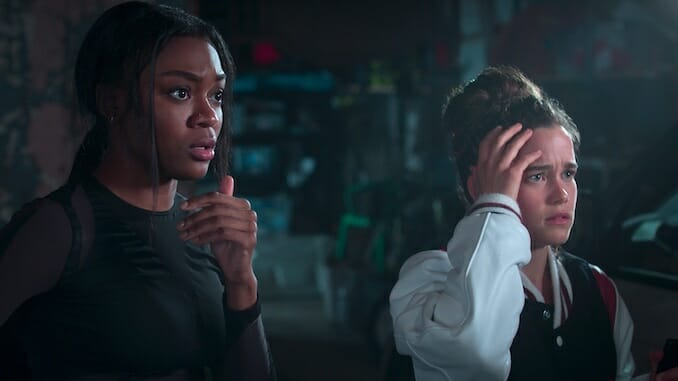First Kill’s Heartbreaking Finale Raises the Stakes to a Fault
Photo Courtesy of Netflix
Netflix’s queer, vampire romance First Kill just dropped its entire first season on June 10th, leaving fans with eight episodes to sink their teeth into. For a genre that’s been killed, resurrected, and killed again, the series creates unique mythology for both its vampires and monster hunters, which is refreshing for any fan of classic vampire stories. With all the elements that made Twilight and The Vampire Diaries as addictive and globally successful as they were, First Kill offers its audience a story of love, loss, and betrayal that desperately needs to continue beyond its first outing.
The first season follows teenage vampire Juliette Fairmont (Sarah Catherine Hook) as she increasingly becomes ill from putting off her first kill, as well as following teenage monster-hunter Calliope Burns (Imani Lewis) as she struggles to make her own first kill. After the two girls officially meet at a party, they become rivals, but not before their own feelings start to get in the way. Their families, led by stand-outs Margot Fairmont (Elizabeth Mitchell) and Talia Burns (Aubin Wise), struggle with their daughters’ connection as they refuse to deviate from their natural hatred of the other. With a slew of other monsters, estranged brothers, and monster-phobic Southern moms to contend with, the series successfully revitalizes the tired teen-vampire genre while leaving a number of loose threads to tie up, unfortunately to its own detriment.

After Episode 7’s shocking cliffhanger, which found Cal’s brother Theo bleeding out in Apollo’s arms after interference from Juliette’s sister Elinor, Episode 8 (titled “First Betrayal”) tries its hardest to create as many cliffhangers as it possibly can. Seemingly competing with similar Netflix original Warrior Nun, which ended its first season quite literally in the middle of the epic boss battle the show had been building up to, First Kill also ends right in the middle of a majority of its storylines.
While cliffhangers have been a central part of the television experience since the birth of episodic, this uniquely Netflix problem of treating the first season of a show like a pilot rather than just a single pilot episode creates frustration in viewers as well as a lack of a fully realized story. The traditional season finale will leave questions unanswered, of course, but it will also wrap up a number of season-long plots along the way. Both First Kill and its predecessor Warrior Nun only did the former, leaving every question unanswered, making a second season a requirement instead of an opportunity for another story to be told.
In the middle of the final episode, Margot and Sebastian receive a letter requesting their presence in two days to defend Fairmont matriarch Divina’s position as Keeper of the Emerald Malkia; a meeting which is sure to end poorly for the Fairmont clan considering Sebastian, you know, ate her. But the woes don’t end there for the Fairmonts, as Juliette got the ultimate revenge on her sister by turning her over to the police, handing them the key to her “murder locker.” While none of these points are truly resolved, they’re all incredibly interesting, especially with series stand-out Grace Dzienny delivering the cherry on top of her season-long comforting yet chilling performance as Elinor.
-

-

-

-

-

-

-

-

-

-

-

-

-

-

-

-

-

-

-

-

-

-

-

-

-

-

-

-

-

-

-

-

-

-

-

-

-

-

-

-








































